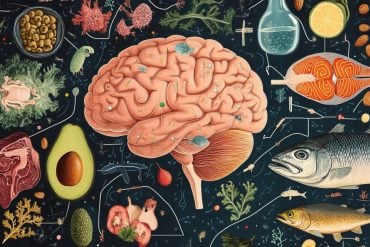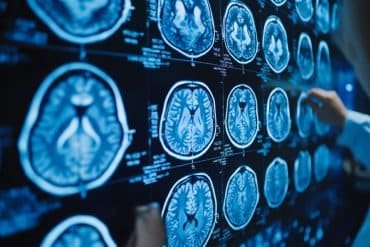Summary: Activation of a neural circuit can inhibit binge like eating behaviors in mice.
Source: Baylor College of Medicine.
While binge eating affects about 10 percent of adults in the United States, the neurobiological basis of the disease is unclear. Researchers at the USDA/ARS Children’s Nutrition Research Center at Baylor College of Medicine and Texas Children’s Hospital found that certain neural circuits have the ability to inhibit binge-like eating behavior in mice. Their report appears today in the journal Biological Psychiatry.
“Human literature suggests that dysfunction of the serotonin system or dopamine system in the brain may be associated with developing binge-like eating behavior,” said Dr. Yong Xu, associate professor of pediatrics at Baylor and senior author of the paper. “However, mechanistically, there’s no direct evidence to show how this system affects behavior.”
In this study, Xu and colleagues identified a neural circuit where a group of serotonin neurons project to and activate dopamine neurons. They showed that activation of this circuit can inhibit binge-like eating behavior in mice.
In addition, since there are 14 potential receptors that can mediate complex effects of serotonin in the body, Xu and colleagues identified a specific receptor that is important in binge-like eating behavior. They determined that the serotonin 2C receptor, which is expressed by dopamine neurons, is important in suppressing binge eating.

Xu noted that an FDA-approved drug, a serotonin 2C agonist, is currently being used as a treatment for overweight and obese adults and could potentially be repurposed to suppress binge eating in adults.
Others who took part in the study include Pingwen Xu, Yanlin He, Xuehong Cao, Xiaofeng Yan, Kenji Saito, Chunmei Wang, Yongjie Yang, Antentor Hinton Jr., Gang Shu, and Qi Wu with Baylor; Liangru Zhu with Baylor and Huazhong University of Sciences & Technology in China; Martin G. Myers Jr. with the University of Michigan; Lourdes Valencia-Torres and Lora K. Heisler with Rowett Institute of Nutrition and Health in Aberdeen; and Qingchun Tong with the University of Texas Health Science Center at Houston.
Funding: Funding for the study came from the National Institutes of Health (R01DK093587 and R01DK101379; R01DK092605; R01DK078056), the Naman Family Fund for Basic Research, the Curtis Hankamer Basic Research Fund, the American Diabetes Association (#7-13-JF-61 and #1-15-BS-184 ), the American Heart Association postdoctoral fellowship, Wellcome Trust (WT098012) and BBSRC (BB/K001418/1).
Source: Dipali Pathak – Baylor College of Medicine
Image Source: This NeuroscienceNews.com image is in the public domain.
Original Research: Abstract for “Activation of Serotonin 2C Receptors in Dopamine Neurons Inhibits Binge-like Eating in Mice” by Pingwen Xu, Yanlin He, Xuehong Cao, Lourdes Valencia-Torres, Xiaofeng Yan, Kenji Saito, Chunmei Wang, Yongjie Yang, Antentor Hinton Jr., Liangru Zhu, Gang Shu, Martin G. Myers Jr., Qi Wu, Qingchun Tong, Lora K. Heisler, and Yong Xu in Biological Psychiatry. Published online June 9 2016 doi:10.1016/j.biopsych.2016.06.005
[cbtabs][cbtab title=”MLA”]Baylor College of Medicine. “Activating Dopamine Neurons Could Turn Off Binge Eating Behaviors.” NeuroscienceNews. NeuroscienceNews, 8 August 2016.
<https://neurosciencenews.com/binge-eating-dopamine-neurons-4799/>.[/cbtab][cbtab title=”APA”]Baylor College of Medicine. (2016, August 8). Activating Dopamine Neurons Could Turn Off Binge Eating Behaviors. NeuroscienceNew. Retrieved August 8, 2016 from https://neurosciencenews.com/binge-eating-dopamine-neurons-4799/[/cbtab][cbtab title=”Chicago”]Baylor College of Medicine. “Activating Dopamine Neurons Could Turn Off Binge Eating Behaviors.” https://neurosciencenews.com/binge-eating-dopamine-neurons-4799/ (accessed August 8, 2016).[/cbtab][/cbtabs]
Abstract
Activation of Serotonin 2C Receptors in Dopamine Neurons Inhibits Binge-like Eating in Mice
Background
Neural networks that regulate binge eating remain to be identified, and effective treatments for binge eating are limited.
Methods
We combined neuroanatomic, pharmacologic, electrophysiological, Cre-lox, and chemogenetic approaches to investigate the functions of 5-hydroxytryptamine (5-HT) 2C receptor (5-HT2CR) expressed by dopamine (DA) neurons in the regulation of binge-like eating behavior in mice.
Results
We showed that 5-HT stimulates DA neural activity through a 5-HT2CR-mediated mechanism, and activation of this midbrain 5-HT→DA neural circuit effectively inhibits binge-like eating behavior in mice. Notably, 5-HT medications, including fluoxetine, d-fenfluramine, and lorcaserin (a selective 5-HT2CR agonist), act on 5-HT2CRs expressed by DA neurons to inhibit binge-like eating in mice.
Conclusions
We identified the 5-HT2CR population in DA neurons as one potential target for antibinge therapies, and provided preclinical evidence that 5-HT2CR agonists could be used to treat binge eating.
“Activation of Serotonin 2C Receptors in Dopamine Neurons Inhibits Binge-like Eating in Mice” by Pingwen Xu, Yanlin He, Xuehong Cao, Lourdes Valencia-Torres, Xiaofeng Yan, Kenji Saito, Chunmei Wang, Yongjie Yang, Antentor Hinton Jr., Liangru Zhu, Gang Shu, Martin G. Myers Jr., Qi Wu, Qingchun Tong, Lora K. Heisler, and Yong Xu in Biological Psychiatry. Published online June 9 2016 doi:10.1016/j.biopsych.2016.06.005






